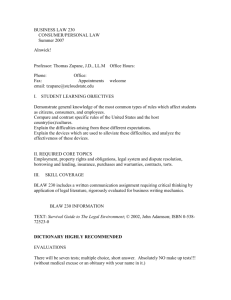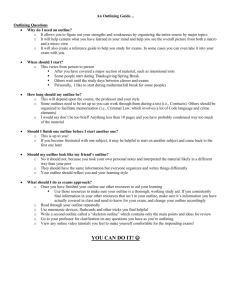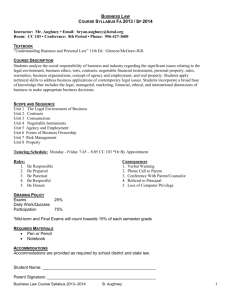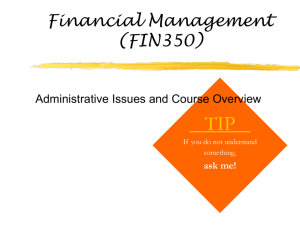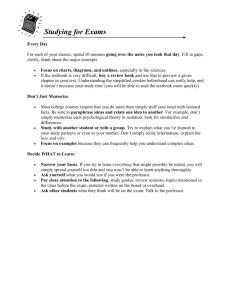here
advertisement
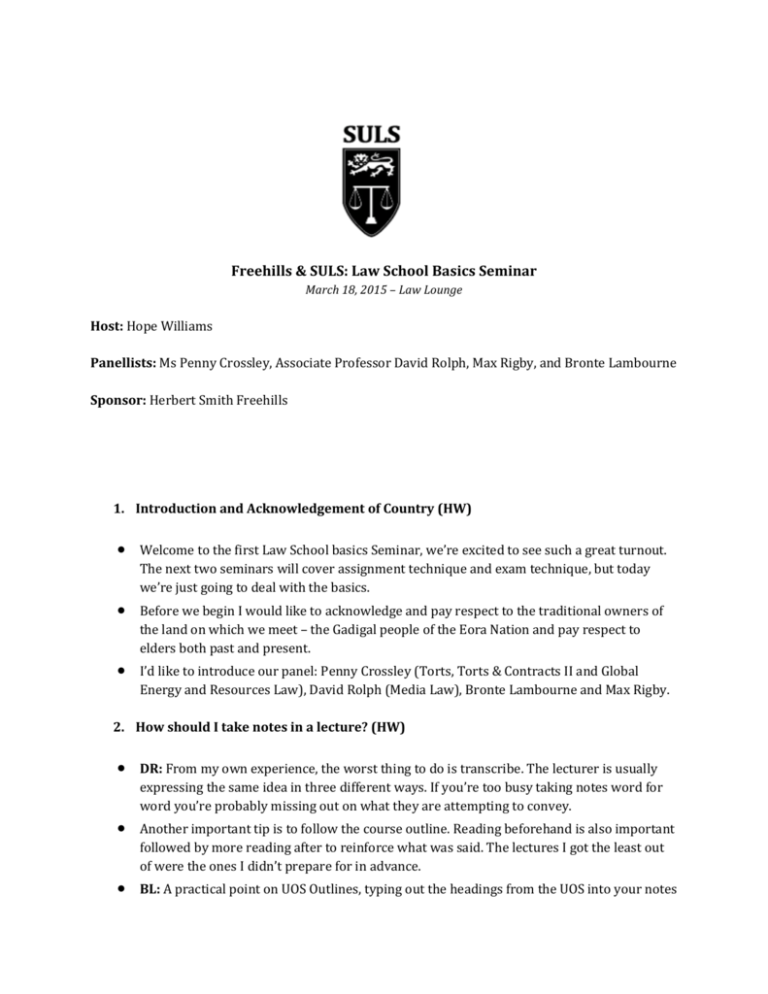
Freehills & SULS: Law School Basics Seminar March 18, 2015 – Law Lounge Host: Hope Williams Panellists: Ms Penny Crossley, Associate Professor David Rolph, Max Rigby, and Bronte Lambourne Sponsor: Herbert Smith Freehills 1. Introduction and Acknowledgement of Country (HW) Welcome to the first Law School basics Seminar, we’re excited to see such a great turnout. The next two seminars will cover assignment technique and exam technique, but today we’re just going to deal with the basics. Before we begin I would like to acknowledge and pay respect to the traditional owners of the land on which we meet – the Gadigal people of the Eora Nation and pay respect to elders both past and present. I’d like to introduce our panel: Penny Crossley (Torts, Torts & Contracts II and Global Energy and Resources Law), David Rolph (Media Law), Bronte Lambourne and Max Rigby. 2. How should I take notes in a lecture? (HW) DR: From my own experience, the worst thing to do is transcribe. The lecturer is usually expressing the same idea in three different ways. If you’re too busy taking notes word for word you’re probably missing out on what they are attempting to convey. Another important tip is to follow the course outline. Reading beforehand is also important followed by more reading after to reinforce what was said. The lectures I got the least out of were the ones I didn’t prepare for in advance. BL: A practical point on UOS Outlines, typing out the headings from the UOS into your notes before you go to lecture really helps you follow the progression of the class. Reading before class also helps you engage with the content and makes for a more enjoyable class. One more point it’s important to not think of a case as standing for one legal principle only, know the facts, look at the reasoning, etc. MR: It’s important to note the different sources of information. Just copying down the lecture slides is a bit of trap, it is important to understand what the lecturer is actually saying. In terms of structure, it’s important to be able to recognise fact patterns because lecturers often use these in exam problems and not just ratios and issues. For open book exams, the structure is important; it must contain everything and be easy to find the information you need. PC: Don’t spend enormous amounts of time formatting and making notes look beautiful at the expense of content. Find a format that works for you at the beginning and stick to it. If you fall behind leave it and keep up to date, and come back at the end to catch up. Get a study buddy, and don’t collaborate on assignments obviously, but split optional cases and do problem questions. 3. Should I read every case or just the cases with the stars next to it? (HW) MR: A blanket rule is not helpful, but you’ll be limiting yourself by only reading starred cases. There are often un-starred cases that may not be the most recent or authoritative, but they provide useful fact patterns that often crop up in exams. If you’ve got lots of time and nothing else to do then it’s probably good to do the optional readings. However, if you’ve got two days before an exam you might want to maximise your time. DR: Sometimes there are very old cases that state very basic self-evident principles of law and you’ll need to cite these. I would also be careful about fact patterns because we often use new scenarios with a twist to try and get students to apply the law. If you don’t like reading and writing – law is not for you. It’s good to start reading early because it only increases and people who struggle in their final year are those who think there is some sort of shortcut. In terms of reading, everyone sets his or her own course. It’s up to you and what you want to get out of it. The key is to start reading at the outset. The reading at the beginning in a course such as Torts is actually quite limited because we understand it takes time for students to become acclimatised to the language PC: A way to do it disastrously wrong is to use those case summary books. There is no substitute for you reading it yourself. The faculty handbook says we expect you to do 3 to 4 hours for each contact hour. BL: You also can’t rely on others people’s notes, because these can be terribly wrong. It’s just one person’s interpretation of the case. In terms of starred cases I just read them all. The importance I give to stars is that it denotes an important or authoritative case that I might spend more time on. 4. In subjects where there is typically a casebook and textbook? Should they buy both? (HW) DR: When students ask this, it’s difficult because they are expensive so I don’t force people to buy books if they won’t get much value out of them. I suggest they spend an hour in the reserve with the book and see if they think it will work for them. Some students may prefer to read from a textbook first to get an idea for the content and then move on to cases. I myself I like to get right into the cases because I like a story, but it is really up to you. PC: The textbooks we use in Torts we often use in Torts and Contract II. The website every student needs to know is booko.com.au which aggregates every bookseller in Australia. I also highly recommend the SULS second-hand book-sale. MR: I always buy the textbook, but it is often used for clearing up a question you might not be able to figure out from the case. Lecturers often teach in a very structured way but if you miss class or take poor notes, textbooks are very good for providing a conceptual framework. BL: Its surprising how many textbooks come in handy again later, I’ve used Torts, Contracts, Equity and Property again. MR: There is also ‘Jekkle’, which allows you to rent books at low rates. 5. For classes that are lecture and tutorial format, what’s the best way to prepare? (HW) PC: Do the problem questions. I expect a minimum of 15 minutes hand written exam plan with the structure of your answer. Anyone aiming for more than a credit will do a 40 min exam conditions exam every week. Students aiming for an HD will do every problem question every week under exam conditions. I’m looking to see how you structure the answer, what authorities your using so it is a great way to get feedback. I even comment on handwriting. BL: Doing problem questions are a great way of determining what you actually know and this is very important. MR: The tutorials where I come having done a lot of preparation, I often feel a lot better in the tutorial. DR: Use the opportunities you have to get feedback. Tutorials are a great way to get feedback and this is what tutorials are for. 6. Early in semester, how can someone start preparing for exams? And should they be? (HW) DR: At this stage it’s more important to master material. By STUVAC I’d only be doing problem questions. During semester I would focus on getting readings done and making notes. Problem questions also help you figure out what you do and don’t know, so you can study better and avoid questions on exams. Studying for exams is very personal; you need to figure out what works for you. In terms of open book and closed book, you still need to prepare and I would recommend preparing as if it is a closed book exam. What is being tested is not if you know the material but if you can apply the material. PC: For many particular subjects it’s easy to guess the exam questions in advance, they often repeat the same ones. The more practice problems you’ve done, you’ll be vastly ahead. It’s great to have a study group for exams so you can work on problem questions and give each other feedback. If you’re doing that try and pick people evenly matched to your ability. Try and find people a little bit better than you so they can push you. DR: Building on PC’s point, if you go back and look at past exams you’ll notice that nervous shock and compensation to relatives keeps coming up. It’s a statutory interpretation question and it determined if you can understand that concurrent actions can arise out of the same tort. I keep doing it because I just know, no matter how many times I say you should do past problems the quality of answers never improve. The basic issues and skills we test remains the same, it’s only the facts that really change. PC: For criminal law, watch for battered wife syndrome BL: Everyone groans about closed book exams, but I don’t recall opening my book in an open book exam. I recommend creating scaffolds for open page exams, this is a useful way to view your notes rather than trawling through 100 pages of notes. MR: I see it as a flowchart, initially you prepare notes, and then you memorise and then you move on to problem questions. The first two you can do at any time in the semester. I generally avoid scaffolds but I think they’re a great idea. You need to make sure that there aren’t fact patterns that won’t run in your scaffold. DR: Be mindful with scaffolding because often there will be multiple ways to structure a problem question and you need to think about what is the best way to structure the problem. The best answers are the ones that are clearly structured and signposted. My stomach sinks when I see a full page of undifferentiated writing; use headings use signposted and think carefully about structures when working on past problems. 7. When you were speaking of the court headings, did you mean the headings from the course outline? (Audience) BL: At the beginning of the semester I literally just typed out the entire course outline. It saves you time and I think it also helps you understand the broad structure of the course. 8. Do you recommend reading the textbook before cases or vice-versa? (Audience) DR: I think it’s just a personal choice; you need to find what works for you. If you find the textbook sets the scene well before reading cases then you should do that.
